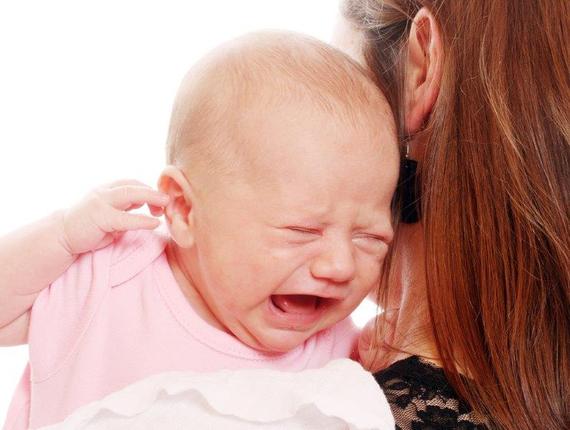
There is nothing glamorous about postpartum depression... just ask Hayden Panettiere, Brooke Shields, Marie Osmond, Gwyneth Paltrow or Courtney Cox bringing to light their experiences of severe postpartum depression. I thought it would be helpful to discuss this scary topic and how easy it is to become a victim of it. It shouldn't take shocking news stories to make you realize the necessity to know more about this common mental condition.
Once your baby is born, you think your body and mind have done all the hard work. So how come the postpartum period can sometimes feel like a perfect storm? The postpartum period officially starts once the baby is born and continues for six weeks at least! I usually tell my patients they get a postpartum pregnancy "pass" for nine months.
The hospital's departing gift of granny panties perfectly highlights your terrifying abdomen, which still looks pregnant for another four weeks, but definitely holds the oversized Tampax and ice packs perfectly. The litany of complaints at this stage includes lack of sleep, trying to forget about the pain while pushing through the "ring of fire," ridiculously sore nipples, and feeling woefully unprepared for the reality of your post pregnancy body. Plus, after having a baby, the "to do" list is endless for a new mom. No matter how helpful your partner is or how many family members or other helpers you have around you, there are things only you can do.
It's all just a little overwhelming. In fact 80 percent of women get the "baby blues." Usually 2 to 3 days after delivery, new moms may begin to feel depressed, anxious, upset and frustrated. It may start out as crying for no reason, not being able to sleep, eat or think clearly, all leading to think there is no way to care for your new bundle of joy. But unlike postpartum depression, the blues get better within days or one to two weeks after delivery. The pregnancy blues are temporary and resolve within weeks of delivery.
What's the difference?
Affecting 10-15 percent of women, postpartum depression makes all the desperate feelings more intense and debilitating to a point where you are unable to perform your daily routine including caring for your baby. The main symptoms can include severe mood swings, intense irritability and anxiety, panic attacks, overwhelming sadness, uncontrollable crying, loss of appetite, inability to sleep, feeling inadequate as a mother, thoughts of harming yourself or your baby, feeling suicidal or wanting to die. Symptoms associated with this incapacitating depression can continue for a year after having a baby.
What factors increase your risk of postpartum depression?
• Having a history of depression or other mental disorders before, during and after pregnancy puts you at a higher risk of getting postpartum depression. Also, if you have had a history in a previous pregnancy, this puts you at risk.
• Emotional Factors -- An unplanned pregnancy, feeling doubtful and insecure, not wanting to be pregnant or have a baby all affects a mom's emotional status and risk for this type of depression.
• Fatigue -- Prolonged fatigue after giving birth or having a C-section increases the risk of postpartum depression.
• Lifestyle Factors -- If a woman has little or no support from her partner, family or friends, has moved to a new city, or has experienced a family death or illness, her risk of postpartum depression increases.
• Hormonal Changes during pregnancy may trigger depression even without a previous history. The hormonal roller-coaster during pregnancy can lead to unexpected consequences.
• Breast Feeding Difficulties -- A small study recently found mothers who stopped breastfeeding due to the pain or having problems getting their baby to nurse were more likely to develop postpartum depression than those moms who stopped breastfeeding due to other problems. Women who had pain, cracked nipples, breast infections, poor milk production or babies who couldn't latch or suck well had a higher risk of depression. We know that women who have problems with nursing need additional support in dealing with the challenges of breastfeeding.
If you or a loved one suspect postpartum depression, what should be done?
Between the hormonal chaos of the postpartum period for women just given birth, suffering from depression is difficult to identify, for both you and your loved ones. The most important thing that can be done if postpartum depression is suspected is to contact the women's obstetrician or health care provider.
Treatment of Postpartum Depression
Treatment includes a combination of drugs including antidepressants and anti-anxiety medications and psychotherapy. It may take 3 to 4 weeks for medications to start working and help manage the unbearable and disruptive symptoms of postpartum depression. And the good news is you can still continue to breastfeed safely while on these medications. Keeping your postpartum routine and bonding rituals with your baby is vital in the treatment process.
Postpartum psychosis is extremely rare (
The exhilaration when you first hold your newborn in your arms is perfection for so many women. For others, the birth of a baby can trigger an emotional chaos that quickly spirals and becomes uncontrollable and frightening. The medical community recognizes that postpartum depression is a complication of giving birth and can be treated through medication, psychotherapy and support. Communicating openly and honest with your partner and family is vital. If you or your loved one experience signs of depression and being withdrawn from your newborn, it's vital to reach out and follow up with your health care provider.
It's so important you get your rest, ask for help and know with time and patience, postpartum depression will resolve -- but it is something you should never experience alone.
___________________
If you -- or someone you know -- need help, please call 1-800-273-8255 for the National Suicide Prevention Lifeline. If you are outside of the U.S., please visit the International Association for Suicide Prevention for a database of international resources.